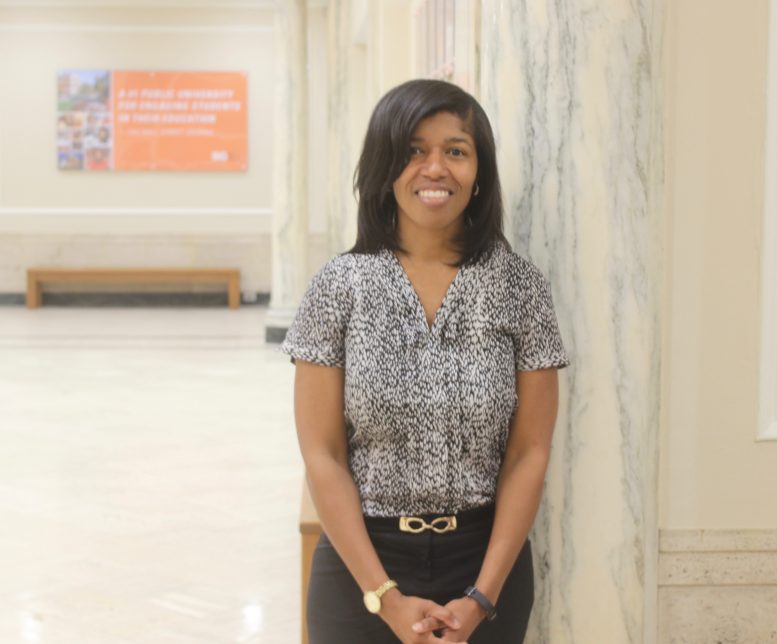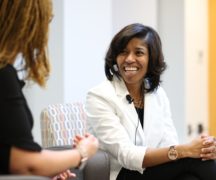By DAVID DUPONT
BG Independent News
When Jennifer McCary, then Jennifer Key, first visited Bowling Green State University she was along for the ride. Her friends were looking at BGSU, but it wasn’t on her list.
Until she got here. “I fell in love with it.”
She ended up enrolling here, as an art education major with a concentration in stone sculpture. She also found love here, meeting her Falcon Flame Jerome McCary.
After graduating in 2005, she taught for a year, and then came back to get a master’s degree in college student personnel in 2008
Then in January 2018 she returned as assistant vice president for student affairs/Title IX officer.
“I returned here because I wanted to serve my alma mater,” she said. “It’s a great thing to be able to love the place you went out to school. I’m fond of BG the city, and my heart is with BGSU as an institution
Now McCary has assumed a new role.
Late in June, President Rodney Rogers named her chief diversity and belonging officer reporting directly to him. She is also a member of the president’s cabinet.
The “belonging” in the new title is key.
The university’s recently adopted strategic plan calls for “empowering and supporting our people to achieve excellence.”
McCary said that requires “making sure we’re really fostering an environment where people feel like they belong.”
The university has to go beyond recruiting a diverse student body, which is essential given shifting demographics.
“Once they’re here we want to make sure they feel heard and valued like this is home,” McCary said. “That’s where the belonging piece comes fits in. We want people to feel like they belong at BGSU.”
Her own experience as a woman of color on campus gives her insight into what students, faculty and staff who have similar backgrounds experience. Every day, she was on campus, she was made aware of her identity.
“That was my experience,” McCary said. “I want to show people that you can have a great connection to BGSU. I forged some of my closest friendships here. I’m a Falcon Flame. I found so many great opportunities here.”
A student protest in spring, 2017, over the way the university was handling complaints about sexual assault led to her return to campus.
A task force set up in the wake of the protest led to a number of recommendations including creating of the position she would fill.
She came to BGSU from Gettysburg College, where she had similar duties relating to Title IX compliance and diversity and inclusion.
In the past 18 months, the university has made “tremendous progress” in how it handles sexual assault in the context of Title IX.
“We were able to create information for all reporting and responding parties so they would understand their rights and responsibilities.” More than 2,500 faculty and staff and more than 2,000 students have received mandatory reporter training.
A new policy related to handling sexual assault that offered a comprehensive and thorough look at the process and revamped the adjudication process was unveiled in September.
That policy includes the option for “restorative justice.”
Through this process anyone who is affected by an event gets a chance to be heard with the goal of figuring out how address the harm done by the incident.
“It’s a much more inclusive approach and a much more educational approach,” McCary said.
“Historically processes were seen as punitive,” she said. “We don’t want that. Even though we want accountability, we want people to walk away having learned something and restorative justice is really helpful in that.”
The university has also hosted a Title IX summit that brought representatives from 30 different institutions to campus.
The challenges are also great when working to foster diversity and inclusion at BGSU.
“No matter how hard we work to move the dial here on campus, there are still certain groups of people who are going to feel like their identities are invisible or they don’t matter,” McCary said. “We’re constantly fighting to let people know that at least here on this campus that we really do respect, appreciate and value the good work of every single person here.”
She continued: “We know that not everyone has the same values as our institution envisions. How do we help people who don’t necessarily understand or agree with our direction or vision, especially as it relates to diversity and inclusion, understand that part of being a Falcon is really making sure that we are taking ownership of caring for each other?”
Building community is central. That means having places where “dialogue can happen, where expression can happen,” she said.
Residence halls and learning communities have done important work in this as have the Honors College and academic departments.
Still some groups will feel excluded. “We need to identify who those groups are and why they feel that way and what we can do to help.”
Those groups have been historically marginalized and underrepresented. They include first generation students, low income students, and students of color. There are also faculty or staff who are members of those historically underrepresented groups.”
It’s important for people to understand the social constructs that “created the dynamics we’re working against,” McCary said. “We have to be very intentional about dissecting some of that and making sure people also have an understanding why we’re asking them to dissect things that existed historically in our nation.
Not, that she thinks that “there is a ton wrong,” McCary said. “I just know there are differences and everybody has a right to different opinions. While we try to protect freedom of speech, while we try to protect freedom expression, while we have to protect everyone’s diversity, we also have to get them to respect that everyone should have that as well.
“Everyone should also feel they can be here and be safe. Safety is more that just not having a physical threat of harm. Safety is about your mental and emotional well being as well. We just want to be sure we help people understand all the things that go into an inclusive space. That’s why we started to talk about belonging.”
Those issues were central to the discussion in spring semester about dropping the Gish name from the film theater on campus.
The Black Student Union ignited the debate over the name because of actress Lillian Gish’s prominent role in the silent film “The Birth of a Nation.” The film promoted the Ku Klux Klan and was used as a recruiting tool for the revived and expanded hate group.
The issue prompted “crucial conversations that needed to happen,” McCary said. “We got the opportunity to see the difference in thoughts and perspectives in a very thoughtful way.”
The task force that studied the issue, and eventually recommended that the name be changed, “worked through all those perspectives and voices.”
The removal of the name, approved by the university’s board of trustees, “was not to dishonor anyone,” she said. “It was more about the physical location and space on campus and how that made people who are in our community feel.”
McCary said she hopes people who are concerned read the report. “The task force did a very thorough and thoughtful job.”
McCary said she’s spoken to people who disagreed with the decision, yet haven’t looked at the document.
“People really need to take the time to read the report and see the time and thought that went into making that decision.”





